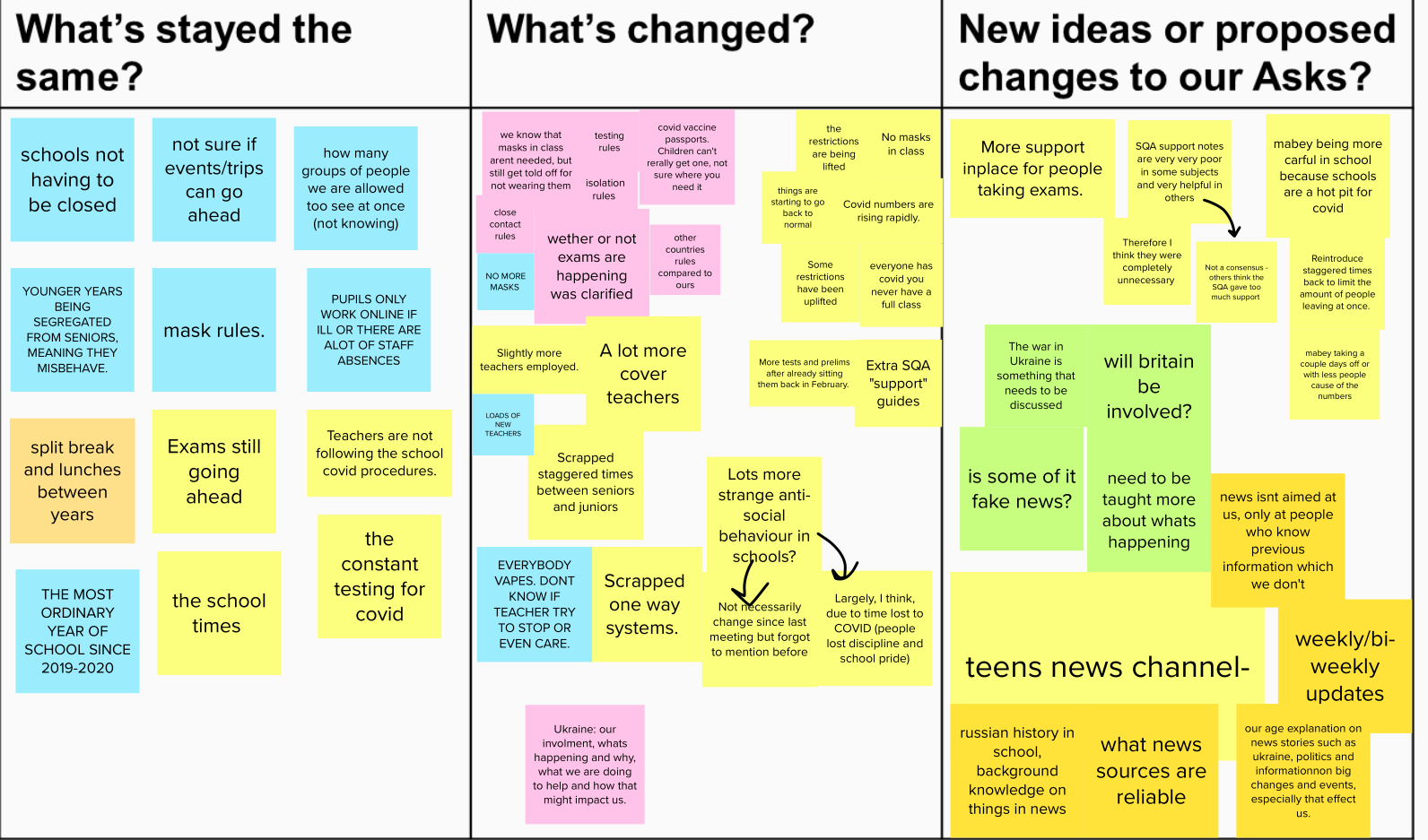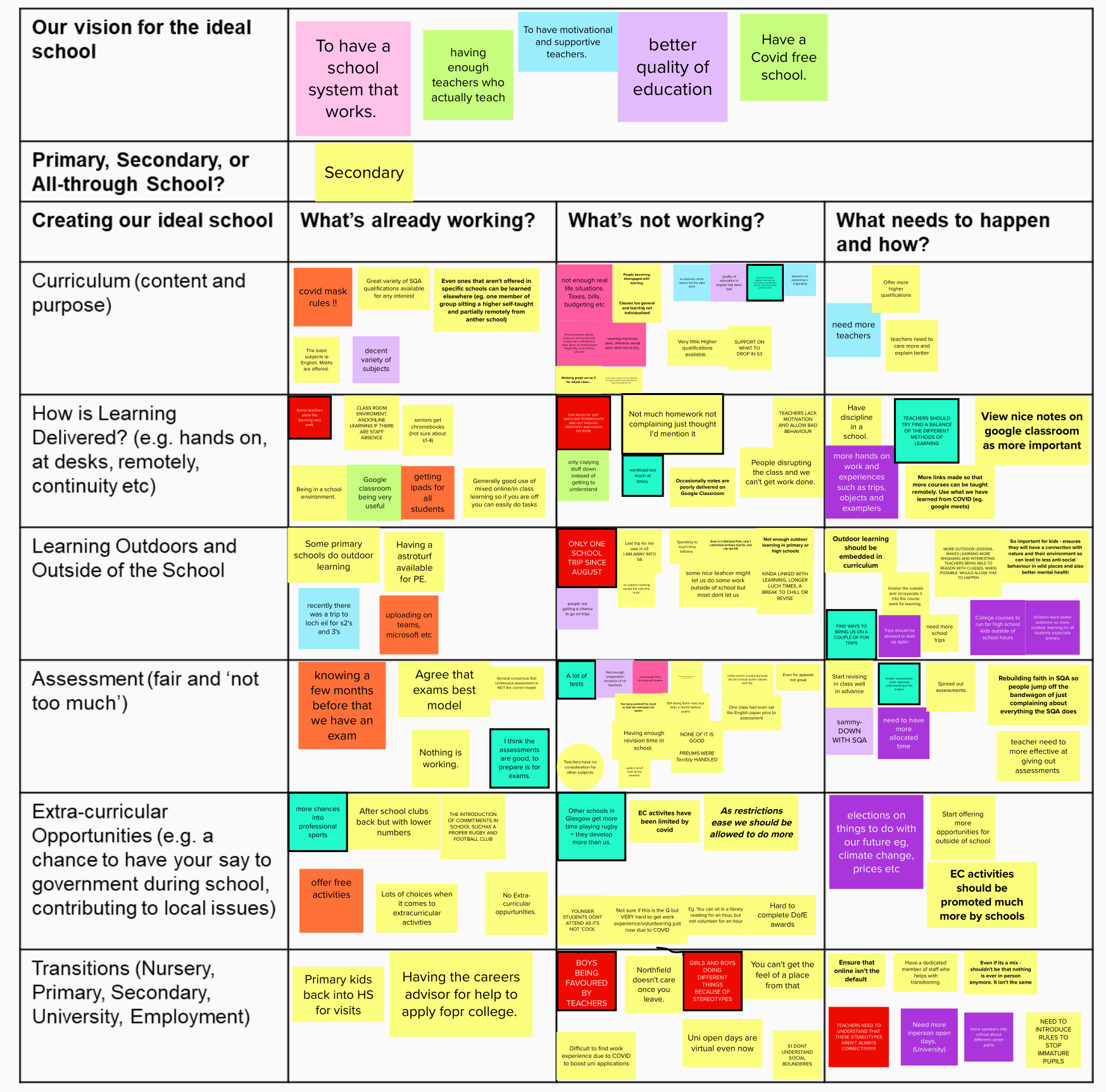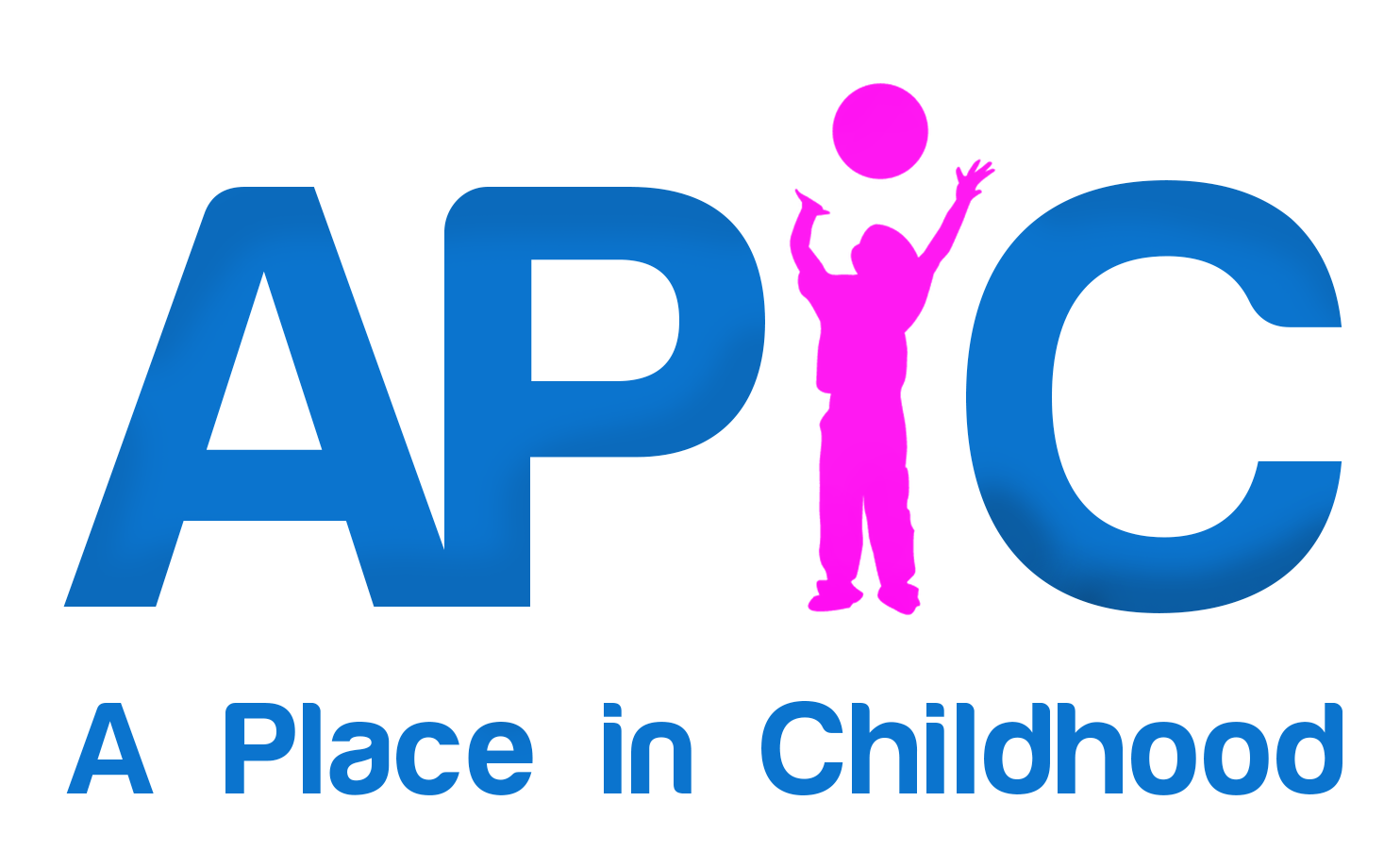In January 2022, we resumed workshops for STAGE 3 of APiC’s COVID-19 Project with Children and Young People. Supported by the Children and Young People’s Commissioner Scotland (CYPCS), #ScotYouthandCOVID3 has recalled the Young Consultants who participated in our original two stages of the project.
The study is participant-led, involving teams from Aberdeen, Edinburgh, Glasgow, and (Rural) Stirlingshire and Falkirk, each with 4-6 boys and girls, aged 10-16 in the first round, and now ages 12-18.
We ended #ScotYouthandCOVID2 with a set of 34 Asks to Scottish Government to improve children and young people’s experiences now and in the future. Our Young Consultants also devised a strategy to create a Manifesto for Children and Young People’s Rights in Recovery that supports the needs of as many across Scotland as possible.
In this next stage, we are fulfilling the Young Consultants’ strategy from #ScotYouthandCOVID2. This includes holding more workshops with our original Young Consultants, as well as primary school children, and other groups that have thus far not had enough opportunity to be heard in the pandemic.
#ScotYouthandCOVID3: Second Workshop with Our Original Young Consultants
In this blog, we report on the second workshop with our original Young Consultants. The primary focus of the discussion was to explore potential ideas and actions around those Asks related to improving the Scottish Education system for all children and young people. Due to the amount we discussed in this workshop, we will be releasing full outputs over the course of the next week. This is therefore blog 1 of a series of 4.
As always, we began the workshop with a Mural Whiteboard task to fill in any missing experiences related to COVID-19 which may have occurred since we last met in January, and for which we first provide a brief overview
Restrictions are Winding Back, but Uncertainty remains
Below is an image of the grid used to gather experiences, showing the collated contributions from all Young Consultants.
The overriding change since January was the winding back of COVID-19 restrictions at school, particularly the requirement to wear masks. This was welcome for most, and had made school life feel the closest to normal that it had been in years. However, some remained concerned that the risk and incidence of infection were as high as they’d ever been in Scotland, and that care and restrictions still served a purpose!

The outbreak of war in Ukraine also came up, with Young Consultants highlighting the lack of clear information about the situation for young people. The need was related to their Asks around schools having greater focus on learning relevant to current real-world issues and their interests, and for reliable news sources for young people.
‘I don’t think anyone in our school actually knows what NATO is or anything, either… so all the news coming out now is aimed at people that already know stuff about it. But it’s something that affects all of us really. We don’t know what this is, or what that says, there’s no explanation on it really. And when you ask your parents, they can’t even explain it to you.’ Young Consultant, age 15
As with COVID-19, the lack of knowledge which could help young people make sense of the situation, is contributing to unnecessary anxiety, and the spreading of fake news and theories.
Improving Our School System
The second, and main, aim of the workshop was for the Young Consultants to flesh out their vision for an improved secondary school system, and how they would achieve it.
Below, is the completed Mural Whiteboard grid, collating all points and ideas, and which draws on experiences from S1-6 across 5 local authority areas and 6 schools. You can see a full-size version here.

The remainder of this blog is worded in the first person, to represent the voice of our Young Consultants on the important ideas they raised.
Principles for a Care-full Education
We are clear that the Purpose of secondary school should be to enable each and every child in Scotland to have equal opportunity to fulfil their full potential in education. As well as in their subsequent contribution to society, and to tackling the big issues it faces.
We propose that all improvements and measures of success should be guided by some Core Principles:
- For us, this is the most important principle and underlies all the others. We feel the education system can be machine-like and doesn’t care about us or our teachers.
Two particular areas where this principle should be applied include:
- Caring, and care for, teachers. We need adequate numbers of teachers, and for them to genuinely care about their subject matter, our well-being, effective education, and our self-development and personal challenges (all of us have teachers who do, and they make a massive difference!).
Equally, we see the increasing workload and time pressures our teachers suffer, and believe they would have greater capacity for care if there was greater care for them too;
- Careful and considerate timetabling, so education is delivered around our individual abilities, needs and interests. This would promote our attainment and benefit to society.
Effective timetabling would also help to avoid undue stress and piling up of workload and assessments, while accounting for our well-being and important extracurricular interests and pursuits;
Pupil-centred and adaptive. Motivating and enabling all pupils to reach their full potential, through a pupil-centred approach to the curriculum, qualifications, assessment, and pathways into employment.
- Aspiring High. By engaging us more on what excellence in education looks like, and learning from what works best, our schools would be enabled to provider a higher quality than many of us have so far experienced;
- Fair and equitable. Enabling Scottish education to be a level playing field for all young people, regardless of background or location. Three areas important to fulfilling this principle include:
- Fair resourcing. Schools known to have more challenges should get the best teachers on offer, not those who are already performing well!
- Adaptive schooling. The curriculum and assessment should be adaptive to those of us who want to succeed, yet have additional personal challenges beyond our control. This might include our health or our home situation.
- Dealing with disruption. Teachers need more training on how to integrate or deal with the growing incidence of disruptive pupils in class, so they don’t disadvantage those of us who want to learn;
- Hands on, and Related to Current Issues. We feel we would benefit from greater opportunities for hands-on, practical and effective work in the community, and on the big issues (e.g. Climate Change). We can do this while gaining life and employability skills, as well as knowledge relevant to operating in and understanding the real world.
- COVID safe. Upholding consistent and meaningful precautions, which are respected by all, and effectively enforced. This would limit the spread of COVID-19 among staff and pupils;
- Offering greater opportunities for learning outdoors and in the community, and providing high-quality, tasty and nutritious meals to all.
- Celebrating different cultures, and understanding different needs and perspectives;
This is just the overview of what Young Consultants’ told us and we have more detail to share over the coming days.
What’s Next?
In the next blog, we’ll report on specific findings around how Young Consultants would change the school curriculum and its delivery. In remaining blogs, we’ll also explore their redesign of Learning Outdoors and outwith the school, assessments, extra-curricular activities, and transitions. Tune in tomorrow to find out more!
We will also be convening workshops with one more seldom heard group over the next month, as well as reconvening our original Young Consultants to discuss our findings. If you are interested in finding out more about this project, or getting on the mailing list to receive a link to our Scotland-wide survey later in the year, please get in touch with Dr Jenny Wood at jenny.wood@aplaceinchildhood.org.
We will be posting further updates on this project as we go, so follow us on Twitter for updates. We will also be writing a report at the end of the project, to chronicle our journey to the Children and Young People’s Manifesto for Rights in Recovery.
Read about wave one and wave two of #ScotYouthandCOVID here.
